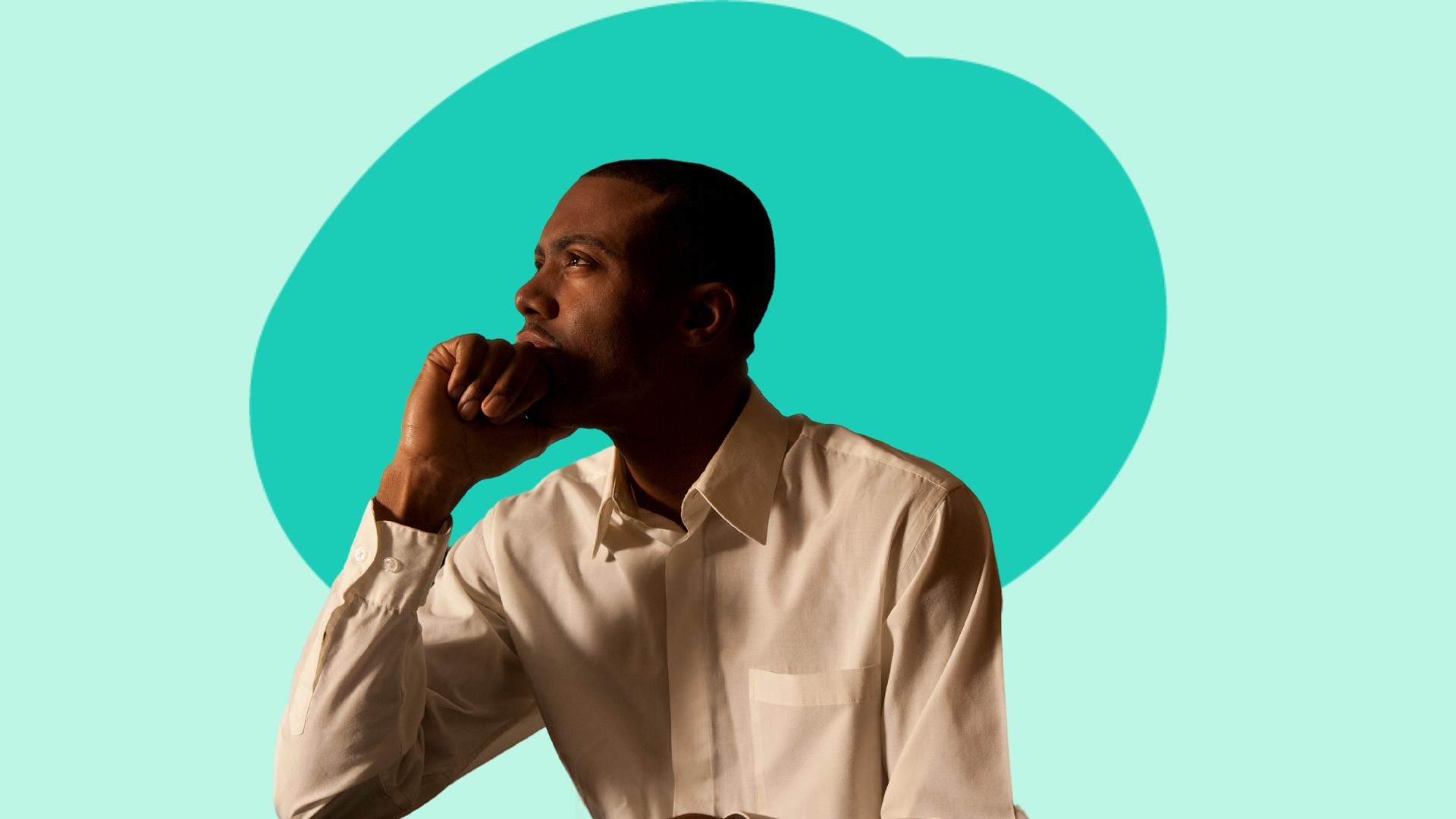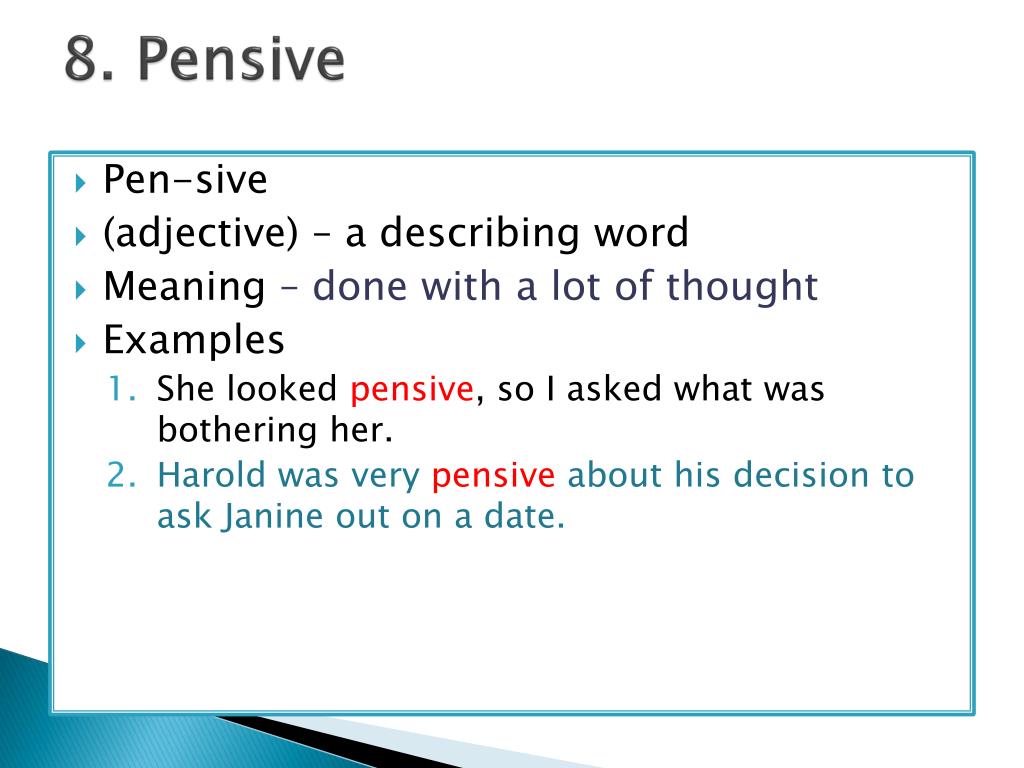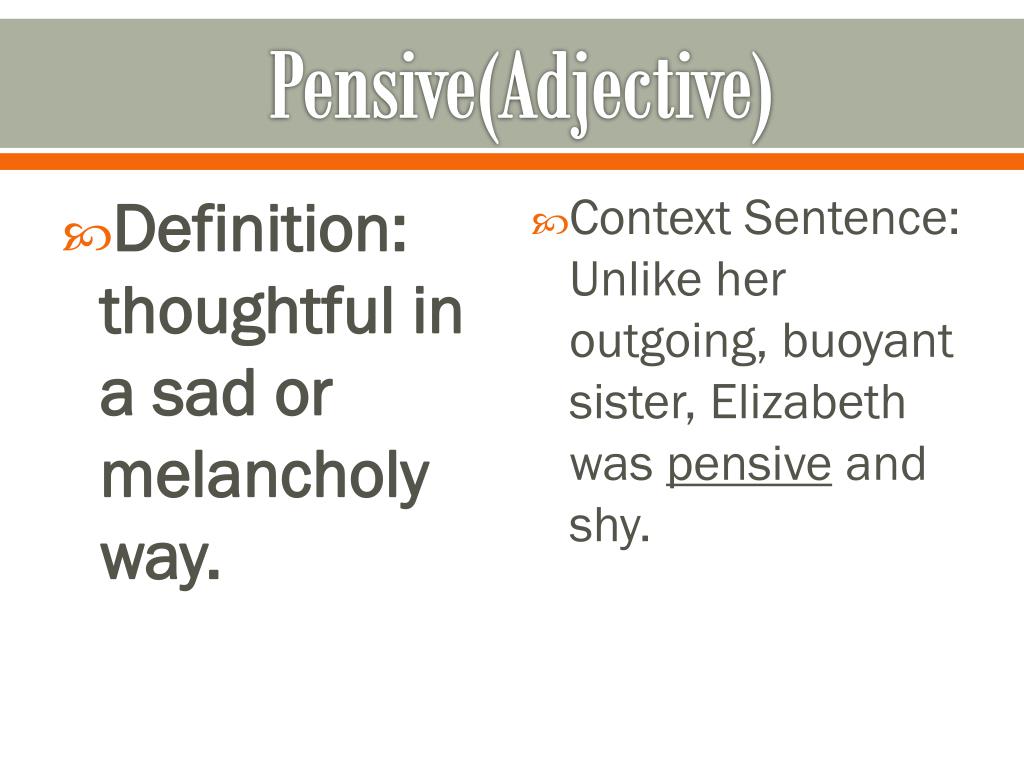Unlocking 'Pensive': Deeper Than Just Thinking
Have you ever seen someone staring out a window, lost in thought, perhaps with a slight furrow in their brow or a distant look in their eyes? That quiet, introspective moment, often tinged with a touch of seriousness or even melancholy, is precisely what we describe as being "pensive." It's a state of mind that goes beyond mere thinking, delving into a deeper, more profound engagement with one's thoughts. This article aims to unravel the full "pensive meaning," exploring its nuances, origins, and how this seemingly simple word encapsulates a rich spectrum of human emotion and intellectual activity. By understanding "pensive," we gain a clearer lens through which to observe and interpret the silent, internal worlds of ourselves and others.
In a world that often celebrates constant activity and outward expression, the concept of being "pensive" offers a valuable counterpoint. It invites us to appreciate the quiet power of introspection, the moments when our minds are not merely processing information but are truly engaged in deep, often musing or dreamily thoughtful contemplation. From its precise dictionary definitions to its subtle emotional undertones, we will journey through what it truly means to be "pensive," providing a comprehensive guide for anyone seeking to master this evocative English word.
Table of Contents
- 1. The Essence of Pensive: A First Look
- 2. Deconstructing the Definition of Pensive
- 3. The Etymological Journey of 'Pensive'
- 4. Pensive in Context: How to Use the Word
- 5. Distinguishing Pensive from its Synonyms
- 6. The Antonyms of Pensive: What It's Not
- 7. The Psychology Behind Pensiveness
- 8. Embracing the Pensive State: A Path to Self-Discovery
- Conclusion
1. The Essence of Pensive: A First Look
At its core, the "pensive meaning" revolves around a state of deep and often quiet thought. It's not just casual thinking or problem-solving; it implies a more profound engagement with one's inner world. As the Cambridge Dictionary suggests, "Pensive means thinking in a quiet way, often with a serious expression on your face." This initial definition captures the visual and emotional cues often associated with someone who is pensive. Consider the classic image: "See that person staring out the window who looks so sad and lost in thought." This vivid description perfectly encapsulates the essence of pensiveness. It's a moment of stillness, where the mind is actively engaged but the body might be motionless, reflecting an internal journey. The individual might appear distant, withdrawn, or preoccupied, not necessarily in a negative way, but simply absorbed in their own reflections. This initial understanding sets the stage for a deeper exploration of what the word truly signifies.2. Deconstructing the Definition of Pensive
To truly grasp the "pensive meaning," we need to break down its various facets as presented by authoritative sources. The word is rich with subtle implications that differentiate it from mere "thoughtful" or "thinking."2.1. Pensive: More Than Just Deep Thought
Many dictionaries concur that "pensive means deeply or seriously thoughtful." Dictionary.com elaborates, stating that "pensive means dreamily or wistfully thoughtful, often with a tinge of sadness." This adds layers to the definition. The "dreamily" aspect suggests a less structured, more meandering form of thought, perhaps not focused on a specific problem but rather on broader concepts, memories, or possibilities. It's a mental state where one's thoughts might drift, allowing for creative or imaginative contemplation. The Oxford Advanced Learner's Dictionary defines "pensive" as an adjective meaning "thinking in a quiet way, often with a serious expression on your face." This highlights the outward manifestation of an internal state. A pensive person might not be speaking, but their facial expression, their posture, or their gaze can communicate the depth of their engagement. It’s about being "engaged in, involving, or reflecting deep or serious thought," as further elaborated by various linguistic resources. It's a quality that suggests an individual is truly immersed in their mental landscape, perhaps exploring complex ideas or revisiting significant experiences.2.2. The Nuance of Sadness and Wistfulness
A recurring theme in the definition of "pensive" is the presence of a "tinge of sadness" or a "wistful" quality. This is a crucial element that distinguishes "pensive" from other synonyms for thought. Dictionary.com explicitly mentions "often with a tinge of sadness," and the OED notes that it often "connotes a wistful, dreamy, or sad quality." This doesn't mean that every pensive moment is overtly sorrowful, but there's often an underlying sense of reflection on something perhaps lost, desired, or simply a contemplation of life's complexities that evokes a quiet melancholy. For instance, "While pensive poets painful vigils keep" (Alexander Pope) beautifully illustrates this connection between pensiveness and a somewhat somber, dedicated contemplation. It's the kind of thought that can arise from introspection about past events, future uncertainties, or the bittersweet nature of human experience. This subtle emotional coloring is what gives "pensive" its unique resonance and depth, making it a powerful word to describe a specific kind of thoughtful state.3. The Etymological Journey of 'Pensive'
Understanding the origin of a word often illuminates its full "pensive meaning." The word "pensive" has a fascinating etymological journey that traces back through Old French and Latin, revealing its inherent connection to thought and even a sense of weight. The word "pensive" comes from the Old French "pensif," which itself is derived from "penser," meaning "to think." This Old French verb, "penser," ultimately stems from the Latin word "pensare," which means "to weigh," "to consider," or "to ponder." The root "pens-" implies a process of weighing ideas, deliberating, or considering something carefully. This etymological lineage is highly significant. The idea of "weighing" thoughts suggests a careful, deliberate, and often serious engagement with one's mental content. It's not a fleeting thought but one that carries a certain gravity or importance. This historical context reinforces the contemporary "pensive meaning" as being deeply or seriously thoughtful, often with a sense of gravity or introspection. It highlights that the word has always been associated with a significant mental effort, a profound consideration of ideas rather than superficial reflection.4. Pensive in Context: How to Use the Word
Knowing the "pensive meaning" is one thing; using it effectively in sentences is another. The word typically functions as an adjective, describing a person or an expression that conveys deep thought, often with a hint of seriousness or melancholy. When we say someone "is pensive," we are describing their current state of mind and often their outward appearance. For example, "He is pensive, the opposite of cheery and carefree." This sentence clearly contrasts the state of pensiveness with a lighter, more unburdened demeanor, emphasizing the serious or reflective quality inherent in being pensive. The word can also describe an expression or a mood. One might speak of a "pensive look" or a "pensive mood." This implies that the pensiveness is evident to an observer, even if the person isn't explicitly stating their thoughts. It's about "expressing or suggesting pensiveness," as some definitions note. It's a powerful descriptor because it conveys both an internal state and its external manifestation, allowing for a nuanced understanding of a character or situation.4.1. Real-World Examples of Pensive Moments
To truly master the word "pensive" in English, let's look at more examples: * **A student after a challenging exam:** "After the difficult math test, Sarah sat by the window, looking pensive, perhaps replaying her answers in her mind." * **An artist contemplating their work:** "The painter stood before her unfinished canvas, a pensive expression on her face as she considered the next brushstroke." * **Someone reflecting on a significant life event:** "On the anniversary of his grandmother's passing, John became quiet and pensive, lost in memories." * **A leader weighing a difficult decision:** "The general wore a pensive frown as he studied the battle maps, contemplating the lives at stake." These examples highlight how "pensive" is used to describe moments of deep internal processing, often accompanied by a serious or reflective outward demeanor. It captures that specific human experience of being "engaged in deep and serious thought," as various sources describe.5. Distinguishing Pensive from its Synonyms
While "pensive" shares common ground with words like "thoughtful," "meditative," "reflective," and "contemplative," each carries its own distinct shade of meaning. Understanding these nuances is key to fully appreciating the specific "pensive meaning."5.1. Pensive vs. Meditative vs. Reflective
The "Data Kalimat" provides an excellent distinction: "Pensive, meditative, reflective suggest quiet modes of apparent or real thought." However, they differ in intensity and purpose. * **Pensive:** As we've established, "Pensive, the weakest of the three, suggests dreaminess or wistfulness, and may involve little or no thought to any purpose." This is a crucial distinction. While it implies deep thought, it doesn't necessarily mean the thought is structured or aimed at a specific goal. It can be a wandering, musing state, often with that characteristic tinge of sadness or wistfulness. It's about being "thinking a lot about something, especial..." as one definition hints, but without necessarily a clear objective. * **Meditative:** "Meditative involves thinking of certain facts or phenomena, perhaps in the religious sense of ‘contemplation,’ without necessarily having a goal of..." Meditative thought is often more focused than pensive thought, even if it doesn't have a direct problem to solve. It implies a sustained, often calm, and deliberate engagement with a subject, often for spiritual or personal growth. It can be a systematic process of dwelling on an idea or concept. * **Reflective:** This implies looking back, often on past experiences, actions, or ideas, to gain insight or learn. It's about processing what has happened and understanding its implications. Reflective thought often has a purpose: to learn, to grow, to understand. While it can be deep, it's typically directed backward in time. In summary, while all three involve quiet thought, pensive is the most open-ended and emotionally tinged, meditative is more focused and sustained, and reflective is backward-looking and purposeful.5.2. Pensive vs. Contemplative vs. Thoughtful
These adjectives also describe states of thinking but with different emphases: * **Pensive:** Again, characterized by deep, often melancholic or wistful thought, sometimes without a clear objective. It often has the "appearance of deep, often melancholic, thinking." * **Contemplative:** This implies a prolonged, deep, and often abstract consideration of something. It's usually more intellectual and philosophical than pensive. A contemplative person might be pondering the meaning of life or complex theories. It suggests a more deliberate and sustained mental effort, often detached from immediate emotions. * **Thoughtful:** This is the broadest term. It can simply mean "full of thought," but it also carries the connotation of being considerate of others. A thoughtful person might be deep in thought, but they might also be showing kindness or care. When referring to thinking, "thoughtful" can be less intense or less emotionally colored than "pensive." The OED notes that "Pensive, contemplative, reflective, meditative, thoughtful these adjectives mean characterized by or disposed to deep or serious thought." However, "Pensive often connotes a wistful, dreamy, or sad quality," which sets it apart as having a specific emotional undertone that the others may lack. This distinction is vital for precision in language.6. The Antonyms of Pensive: What It's Not
Understanding what a word is not can often clarify its "pensive meaning." If "pensive" implies deep, quiet, often serious or wistful thought, its antonyms would describe states of mind that are the opposite. The most direct antonyms would be words that denote a lack of deep thought, a superficiality, or a lighthearted, carefree attitude. As the "Data Kalimat" mentions, "He is pensive, the opposite of cheery and carefree." Here are some antonyms and why they contrast with "pensive": * **Carefree:** Implies freedom from worries or responsibilities, a lightheartedness that is the antithesis of deep, serious thought. * **Cheery/Jovial/Joyful:** These words describe a state of happiness and optimism, which contrasts with the often serious or melancholic undertone of pensiveness. * **Frivolous/Superficial:** These describe a lack of seriousness or depth in thought or action, directly opposing the "deeply or seriously thoughtful" aspect of being pensive. * **Unthinking/Mindless:** These suggest a complete absence of thought or consideration, which is the direct opposite of being engaged in profound reflection. * **Distracted:** While a pensive person might seem distant, they are deeply focused internally. A distracted person's attention is scattered and unfocused, which is different. * **Excited/Animated:** These describe states of high energy and outward expression, contrasting with the quiet, introspective nature of pensiveness. By understanding these opposites, the specific "pensive meaning" becomes even clearer: it is a state of mind characterized by profound, internal engagement, often with a quiet, serious, or wistful demeanor, far removed from lightheartedness or superficiality.7. The Psychology Behind Pensiveness
Beyond its linguistic definition, the "pensive meaning" also has a psychological dimension. Why do individuals become pensive? What cognitive and emotional processes are at play during such moments? Pensiveness is often a manifestation of deep introspection. It's a period where the mind turns inward, processing experiences, emotions, and ideas without external distraction. This internal processing can be triggered by various factors: * **Reflection on past events:** Significant memories, both joyful and sorrowful, can lead to a pensive state as one re-evaluates or relives moments. * **Contemplation of the future:** Uncertainties, hopes, and anxieties about what lies ahead can also induce pensiveness, as the mind tries to navigate potential paths. * **Emotional processing:** When dealing with complex emotions like grief, longing, or profound joy, individuals might become pensive as they internally sort through these feelings. The "tinge of sadness" often associated with pensiveness highlights its connection to emotional depth. * **Problem-solving or decision-making:** While not always goal-oriented, pensiveness can also be a quiet phase of deep consideration before making an important choice. The "deeply or seriously thoughtful" aspect comes into play here. * **Creative ideation:** Artists, writers, and thinkers often enter a pensive state when grappling with new ideas or trying to conceptualize complex works. This is where the "dreamily thoughtful" aspect can manifest, allowing for free-flowing, imaginative thought. Psychologically, being pensive can be a healthy and necessary part of self-awareness and emotional regulation. It allows for a deeper understanding of oneself and the world, fostering empathy and personal growth. It's a moment of mental pause, allowing for integration and synthesis of experiences, even if the "purpose" isn't immediately apparent. The state of pensiveness, where one's "head is above the clouds," can be a sign of profound engagement with one's inner landscape, a necessary retreat from the external world to process and synthesize.8. Embracing the Pensive State: A Path to Self-Discovery
In our fast-paced, outwardly focused world, moments of pensiveness might seem unproductive or even melancholic. However, understanding the true "pensive meaning" reveals its profound value. Embracing these quiet, reflective periods can be a powerful path to self-discovery and deeper insight. When we allow ourselves to be pensive, we create space for: * **Self-reflection:** It's an opportunity to examine our values, motivations, and desires without external pressure. This introspection can lead to greater self-awareness and personal growth. * **Emotional processing:** Rather than suppressing difficult emotions, pensiveness allows us to sit with them, understand their origins, and gradually process them. This can be particularly true for the "wistful" or "sad" qualities often associated with the word. * **Creative incubation:** Many breakthroughs in art, science, and philosophy have emerged from periods of deep, unstructured thought. The "dreamily thoughtful" aspect of pensiveness is fertile ground for new ideas. * **Empathy and understanding:** Observing others in a pensive state, or experiencing it ourselves, can foster a deeper appreciation for the complexities of human experience and the internal worlds of others. * **Mindfulness and presence:** While seemingly lost in thought, a pensive state can paradoxically bring a heightened sense of presence to one's internal landscape, making one more aware of their inner workings. Encouraging moments of pensiveness, whether through quiet contemplation, journaling, or simply allowing oneself to stare out a window without distraction, can enrich one's life. It's a testament to the fact that not all valuable activity is outwardly visible; sometimes, the most profound work happens within the quiet confines of a deeply engaged mind. Master the word "pensive" in English, and you master a deeper understanding of human nature itself.Conclusion
We have journeyed through the multifaceted "pensive meaning," uncovering its layers from simple definition to profound psychological implications. We've learned that "pensive" is far more than just thinking; it's a state of being "musingly or dreamily thoughtful," often carrying a "tinge of sadness" or wistfulness. Its roots in the Latin "pensare" (to weigh) underscore its connection to serious, deliberate consideration. We've explored how it differs from synonyms like meditative and reflective, emphasizing its unique blend of deep engagement and emotional nuance. Understanding "pensive" allows us to better describe and appreciate those quiet, introspective moments in ourselves and others – moments that are crucial for emotional processing, creative insight, and personal growth. It's a word that encapsulates the richness of the human inner world, a testament to the power of silent contemplation. Now that you've mastered the intricate "pensive meaning," we encourage you to observe this state in your daily life. Do you notice moments when you or someone around you seems pensive? Share your thoughts and experiences in the comments below! What does being pensive mean to you? Feel free to share this article with anyone who might benefit from a deeper understanding of this evocative word, and explore other insightful articles on our site to continue your linguistic journey.
DiveThru

PPT - Amigo Brothers PowerPoint Presentation, free download - ID:4196987

PPT - Keystone English 10 PowerPoint Presentation, free download - ID